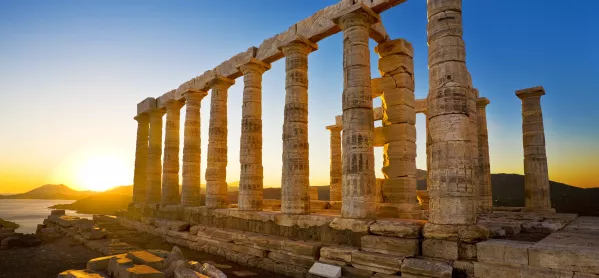At Monifieth High in Angus, the ancient world is being brought back to life - with interesting results.
Classical studies - the study of ancient Greek and Roman cultures - has been declining in state schools for some time. Despite the positive spin offered by some, last year only 108 pupils sat National 5 Classics in the whole of Scotland, while just over 400 sat Higher. These are not the statistics of a subject in rude health.
The decline is not helped by the broad perception of Classics: a difficult, “posh” subject, decidedly not for state school pupils. Indeed, many assume that it is only taught in private schools.
Background: Call to reverse near-extinction of classics in Scottish schools
Quick read: ‘A Classics education can drive social mobility’
Opinion: ‘Why every state school should teach the Classics’
Over the last three years, we at Monifieth have built a small department from scratch, and this session we have more than a hundred pupils learning about the Roman Republic, Athenian religion and the plays of Sophocles and Euripides.
We started with a small group of sixth years, offering them some of the National 5 units as something a bit different, and to earn them some extra SCQF (Scottish credit and Qualifications Framework) points. They loved the classes.
On the back of that, our headteacher gave the go-ahead for me to take another group of S6s through the full National 5 course. Again, the energy of the pupils really made us sit up. This was a subject which none of them needed, and they were in S6 where it is often difficult for pupils to stay motivated once UCAS offers are granted.
Their results were excellent, so last session we offered National 5 to all pupils from S4-S6, 26 in all. More than two-thirds achieved an A grade, but, more than that, they enthused about the classes, and a buzz was created in the school.
This session we have had 26 National 5 candidates, 50 at Higher and a class of 30 in S3 - and the buzz continues.
Throughout, we have been in touch with state-sector and private schools for advice and support, and the reaction of the Classics community has been wonderful. Teachers at Lanark Grammar and St Aloysius’ College in Glasgow have been key in us getting us where we are.
I have taught English for 14 years, and over the last eight have returned to school to sit Highers in Classics and Latin, and then taken on an Open University degree in the subject. I am not shy to say that it is a vocation for me.
But for all of the positives, there is also frustration. As pupil numbers fall in the state sector, the number of new teachers also falls. Gradually, the subject might wither away. We have already seen the SQA (Scottish Qualifications Authority) discontinue Classical Greek in 2015, and the numbers for Latin are not great (253 candidates sat Higher this session).
It was not so long ago that Gaelic was in similar crisis, and the government made the decision to save it. It would be easy to allow Classics and Latin to disappear because they suffer from the popular view of them as elitist.
What we are seeing at Monifieth is evidence to the contrary. Indeed, it is evidence of a universal truth in education: that if the teaching is good and the teacher is invested, the pupils don’t see it as difficult or “not for us”.
It is a peculiar state of affairs in our culture, in that it is hard to imagine a time when the Classics has been so prevalent in the media: new films, books, TV documentaries and video games arrive at a steady flow. Yet, in a society that clearly has an appetite for this wondrous subject, fewer and fewer children are being offered the chance to study it in our state schools.
Equally, our schools are full of teachers who had the chance to study the subject themselves, and retain an enthusiasm for it. We are struggling for teachers in the subject, yet we are sitting on an untapped goldmine: a school might have a science teacher who could teach a National 5 class, or an RMPS (religious, moral and philosophical studies) teacher who could help guide pupils through Higher.
If the subject needs help, we should be creative in how we might go about saving it. We must either find a way or make one.
George Connor is a classical studies and English teacher at Monifieth High School, in Angus, Scotland. He tweets @mhs_classics




